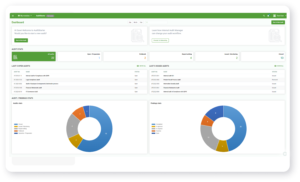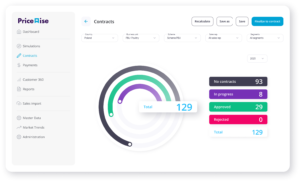- 1. Unprecedented growth in modern technology has caused data-driven decision making to become an integral part of most businesses. Data-driven decisions are backed by hard data, which is now applied in various fields such as healthcare, transportation, and manufacturing industries.
- 2. Crisis go, crisis come
- 3. An ocean of data
- 4. Data: the most precious commodity
Unprecedented growth in modern technology has caused data-driven decision making to become an integral part of most businesses. Data-driven decisions are backed by hard data, which is now applied in various fields such as healthcare, transportation, and manufacturing industries.
2020 is a year of disruption and lockdown. Organizations had not considered the possibility of a pandemic outbreak and thus had not been prepared for its consequences. Something like COVID-19 seemed too abstract to happen. This is why the current pandemic should become an impulse to prepare for future times of unpredictability, to make plans for business continuity and even faster acceleration of digital transformation.
It is an opportunity if companies consciously work with data and build a solid foundation for decision making. But it could also be a threat if the systems like CRM, CLM, ERP, pricing, risk management are fed low-quality data, and data management is based on solutions that are poorly adjusted to the business model.
Crisis go, crisis come
The COVID-19 pandemic could be treated as a benchmark. By learning to take into consideration such challenges as the climate crisis or possible future lockdowns, companies should change their approach to keep up with the new normal after any such revolution. Digitization is the key to remaining competitive and it has never been more true than it is now.
But there is one condition: good data quality.
An ocean of data
With the ongoing global economy’s digital transformation, which — according to recent predictions — may increase by as much as 20% CAGR, amounts of data are skyrocketing. The latest IDC’s Global DataSphere Forecast predicts that more than 59 zettabytes of data (59 trillions of gigabytes) will be created, captured, copied, and consumed in the world this year. And according to IDC, big data size in 2010 was standing at a mere 1.2 zettabytes.
There is even more: the amount of data created over the next three years will be more than the data created over the past 30 years!
All this is happening while at the same time, it is no secret that about 99.5% of all data is never analyzed or used anywhere.
It is rarely a walk in the park to transform an entire organization onto one that is “data-driven”, but this investment pays off, as shown by McKinsey Global Institute: organizations that operate on the basis of data are 23 times more likely to get new clients, six times as likely to retain existing ones and 19 times more likely to increase profitability. The window of opportunity is open now. Don’t miss this chance and secure yourself a good place in the new reality.
Data: the most precious commodity
Building a company’s competitiveness in the context of such a great abundance of data is a strategic-level challenge and should be approached as such.
This is because data is a resource whose use must be included in the organization’s development strategy and must be the fundament for processes contained therein.
This is already happening, and we see it while working with our clients.
Current research by McKinsey shows that 30 percent of companies include data analysis strategies in their broader corporate strategy. In EY’s Capital Confidence Barometer, 34% of respondents see underestimating the challenges of IT integration as the most significant obstacle in deals meeting expectations.
The effective use of data is the most cutting-edge and future-proof area of business. The past few years have already shown, and 2020 confirmed (sometimes painfully) to many organizations how little they tap into the potential they themselves tirelessly create — their own data.
How does one make efficient use of the potential hiding in data? How does one build a data-driven enterprise and reap real benefits from this transformation? 2020 appears to be a final call to follow this path and pursue major structural changes. A shift towards data-centric solutions has already been a global trend for years. In 2020, there is no point risking being left behind.
Would you like more information about this topic?
Complete the form below.


